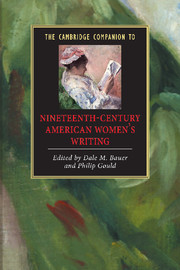Book contents
- Frontmatter
- Introduction
- Part I Historical and theoretical background
- Part 2 Genre, tradition, and innovation
- Part 3 Case studies
- 9 The uses of writing in Margaret Bayard Smith's new nation
- 10 The sentimental novel
- 11 African-American women's spiritual narratives
- 12 The postbellum reform writings of Rebecca Harding Davis and Elizabeth Stuart Phelps
- 13 "Strenuous Artistry": Elizabeth Stoddard’s The Morgesons
- 14 Minnie's Sacrifice: Frances Ellen Watkins Harper’s narrative of citizenship
- Conclusion
- Index
11 - African-American women's spiritual narratives
from Part 3 - Case studies
Published online by Cambridge University Press: 28 May 2006
- Frontmatter
- Introduction
- Part I Historical and theoretical background
- Part 2 Genre, tradition, and innovation
- Part 3 Case studies
- 9 The uses of writing in Margaret Bayard Smith's new nation
- 10 The sentimental novel
- 11 African-American women's spiritual narratives
- 12 The postbellum reform writings of Rebecca Harding Davis and Elizabeth Stuart Phelps
- 13 "Strenuous Artistry": Elizabeth Stoddard’s The Morgesons
- 14 Minnie's Sacrifice: Frances Ellen Watkins Harper’s narrative of citizenship
- Conclusion
- Index
Summary
Within African-American spiritual narratives, conversion most often happens during intense times of loss, grief, misery, pain, and despair, as both a psychological and physical reaction to conditions on earth. Hell is real and it exists on earth; conversion offers deliverance and salvation both for the spiritual body and the physical body. During times of the deepest despair, during the agonies of slavery, during “hell without fires,” most African-American converts reveal that they have been transformed. The rhetoric of conversion relies not just on “otherworldly” experience: for the new believer, conversion offers hope that God can bring healing, comfort, and deliverance to everyday life. Theologian Orlando Costas explains why the conversion experience has special meaning for the “least” of a society:
Conversion is, therefore, a passage from a dehumanized and dehumanizing existence to a humanized and humanizing life . . . it is the passage from death and decay to life and freedom. In conversion, men and women are liberated from the enslavement of the past and given the freedom of the future; they are turned from the God of this age, who passes away, to the God who is always the future of every past. (“Conversion as a Complex Experience,” 21)
- Type
- Chapter
- Information
- Publisher: Cambridge University PressPrint publication year: 2001



